- Home
- Lissa Evans
Their Finest Hour and a Half
Their Finest Hour and a Half Read online
About the Book
It’s 1940. In a small advertising agency in Soho, Catrin Cole writes snappy lines for Vida Elastic and So-Bee-Fee gravy browning. But the nation’s in peril, all skills are transferable and there’s a place in the war effort for those who have a knack with words.
Catrin is conscripted into the world of propaganda films. After a short spell promoting the joy of swedes for the Ministry of Food, she finds herself writing dialogue for ’Just an Ordinary Wednesday,’ a heart-warming but largely fabricated ‘true story’ about rescue and romance on the beaches of Dunkirk. And as bombs start to fall on London, she discovers that there’s just as much drama, comedy and passion behind the scenes as there is in front of the camera . . .
Contents
Cover
About the Book
Title Page
Dedication
Trailer
April 1940
Advertisements
May 1940
The Ministry Of Information Presents . . .
June 1940
Supporting Feature
August 1940
September 1940
Newsreel
November 1940
Food Flash
December 1940
Intermission
January 1941
March 1941
Main Feature
April 1941
Forthcoming Attractions
The day was. . .
August 1941
Acknowledgements
About the Author
Also by Lissa Evans
Copyright
THEIR FINEST HOUR AND A HALF
Lissa Evans
For my uncommon man.
. . . when once work begins in the studio, nothing that happens in the outside world is of any relative importance . . .
George Arliss
TRAILER
April 1940
‘I was wondering,’ Sammy said, tentatively, as they paused between courses at La Venezia, ‘if you should think of getting a new photograph of yourself. Something just a tiny bit more up-to-the-minute, perhaps . . .’
Ambrose’s first impulse was to dismiss the idea – after all, as he reminded Sammy, he’d had a perfectly decent set of prints taken not so long ago and they’d been bloody expensive, and it wasn’t as if his current level of income allowed him to run to unnecessary extravagance. And surely the whole purpose of an agent was to increase a client’s income, rather than spend it for him?
Sammy looked chastened, as well he might.
Back at home that afternoon, Ambrose dug the file of photographs out of the bureau, just to reassure himself, and yes, they were scarcely eight years old – taken in February 1932, not long after the highly successful kinematic release of Inspector Charnforth and the Bitter Lemons Mystery – and really, they were more than adequate: full face, chin on hand, a fine, frank gaze at the camera, a curtain draped artfully across the wall behind, a briar pipe and a volume of verse resting on a table in front. They spoke of depth and maturity, of vigour and yet also of a certain masculine sensitivity. Their invisible caption – unmistakably – was ‘Leading Man’. He put the portfolio away again and gave no further thought to the matter until a fortnight later, in Sammy’s office. Where he was being kept waiting.
‘He’ll be in any minute now, Mr Hilliard,’ the typist kept saying, brightly. ‘He knows you’re expected, only he’s had to take his doggie to the vet, the poor little thing’s ate half a tin of boot polish and it’s been ever so ill.’ And since the chaos of paper on Sammy’s desk meant that it was impossible to discern which script it was that Ambrose was meant to be collecting, he was forced to sit and stew. The 1940 edition of Spotlight was on the office shelf, and he amused himself for a while by looking through the ‘Character Actors’ section – page after page of uglies, fatties, the once-beautiful and the never-handsome, each of them no doubt nurturing the hope that a browsing director, tiring of chiselled good-looks, might one day choose a more ‘interesting’ face for his next romantic lead. Poor deluded saps. He turned the page on the final gargoyle, and pointedly consulted his watch.
‘Any minute now, Mr Hilliard,’ said the typist.
It occurred to Ambrose that he ought to check his own entry in the volume, and re-opening it at the beginning, he started to leaf through ‘Leading Actors’, at first briskly, and then with a growing sense of unease. When he at last reached his own photograph, he stared at it for a while; it seemed, this time, somehow less than satisfactory. He glanced again at the portraits of his rivals, and it was like picking through a police file marked ‘Dangerous Cases’ – all was mood, spleen, sullenness, seething introspection. Here slouched Marius Goring, wreathed in shadow, here Jack Hawkins, peering shiftily from beneath the brim of his hat. Glowering presence succeeded glowering presence. No one stood upright. No one gazed directly at camera. No one smiled. It was clear that the fine, frank gaze had had its hour; nowadays it was de rigueur to look as if one were just about to cosh an old lady.
‘I’ve been thinking about your suggestion of the other day,’ he said to Sammy, when his agent at last arrived at the office. ‘It’s all a matter of style, of course. There are fashions in photography as in everything else, and one simply has to accept the fact. We are in a new and brutal age.’
Sammy nodded, a touch uncertainly. ‘So, you’ll have another picture taken?’
‘If I must,’ said Ambrose.
The photographer was a blue-chinned Hungarian refugee called Erno. He was trying to establish himself in London, Sammy said, and was therefore acceptably cheap. On the debit side, his English was rudimentary.
‘Brooding,’ said Ambrose, who had taken the precaution of bringing the copy of Spotlight with him to the room above a hat shop in D’Arblay Street. ‘Darkly atmospheric.’ He jabbed a finger at the picture of Leslie Howard (another Hungarian, come to think of it; Christ, they were everywhere). It showed the actor gazing dyspeptically off to one side, the dim lighting heightening the contours of his face.
‘Like him,’ said Ambrose, enunciating clearly.
Erno frowned, and looked from Ambrose to the picture of Leslie Howard and then back again.
‘Like heem?’ he repeated doubtfully.
Give me strength, thought Ambrose. ‘Yes,’ he said, trying to keep the exasperation out of his voice. ‘I want you to make me look exactly like him.’
Erno stared at the photograph for almost a full minute, and then went away to a corner of the room and rummaged in a bag. He came back after some time with a piece of what looked like fine cheesecloth.
‘Moment, plizz,’ he said, and began, with painful slowness, to fasten the material over the camera lens.
‘Will you be very much longer?’ asked Ambrose. ‘Only I have an awfully busy day ahead of me.’
ADVERTISEMENTS
May 1940
‘Do you think I should wear my good shoes for the interview?’ asked Catrin, still curled beneath the eiderdown. ‘Not that they’ll be looking at my feet, I suppose . . .’
There was no immediate response from Ellis. He was standing naked beside the window, peering upward between the opened blackouts in an attempt to gauge what the weather might be like at street level, and he scratched his knuckles, one hand and then the other, the skin between them permanently inflamed from contact with turpentine, before turning towards her. ‘What was that?’ he asked.
‘Oh . . . nothing important, really.’ She had learned that she talked far too much in the mornings.
She watched him scoop his shirt from the floor and begin to get dressed. He was tall, the skin very white beneath his clothes, his face high-cheekboned, almost Slavic. Not only handsome
but foreign, she’d thought, with a thrill, when she’d first seen him, though he’d turned out, prosaically enough, to come from Kent.
‘Are you back for supper?’ she asked. ‘Only I suppose I ought to use up the beetroot, it’s starting to get little white spots.’
‘What d’you say?’
‘I was wondering if you’d be back for supper.’
‘No, I’m on duty tonight.’
‘Oh. Well, I could bring you something to eat at the studio, if you wanted.’
He was tying his bootlaces, and he looked up at her with an air of puzzled impatience, as if she would insist on speaking in Swahili; and it was impossible, as always, for her to gauge whether a scarred eardrum meant that he hadn’t quite caught what she was saying or whether he simply wasn’t listening.
‘I could bring your supper to the studio,’ she said again. ‘After I get back from work. If you’d like.’
He gave a grunt and then straightened up, tugging at the sleeves that were always too short for his arms. ‘I’d better be going,’ he said.
She pulled on a dressing-gown and followed him into the kitchen. He was standing beside the table, frowning at the worn pocket-book in which he kept his notes, angling the pages in order to catch the light.
‘Would you type these up for me, Cat?’ he asked. ‘One day soon, before the bloody thing falls to bits.’
‘Of course I would.’
‘Though you probably won’t be able to read my writing.’
‘I will. I’m sure I will. You should see Mr Caradoc’s, it’s all drunken spiders.’
He nodded, his thoughts already elsewhere. ‘See you later, then,’ he said. She stood barefoot on the doormat and watched him climb the basement steps two at a time, and it occurred to her as he disappeared from view that the ‘see you later’ must mean that he was expecting her to come to the studio with some supper, since otherwise he’d go straight from there to the warden’s post at Baker Street, and she wouldn’t see him again until the following morning. Though perhaps she was reading too much into the phrase.
She tended to do that, to pick through his speeches like a cryptologist, trying to elicit answers without having to actually ask him any more questions. And it was nearly always the boring-but-necessary things that he failed to catch the first time – meals and shoe-repairs and what to say to the landlord about the geyser – things that simply had to be sorted out before she left for work. She would hear herself pecking away at the same topic, phrasing and re-phrasing in an effort to dislodge a useful response, and it was dreadful to think of how dull she must sound to him.
She closed the front door and filled the kettle, and put the heel of a loaf under the grill. There was only margarine left, and nothing to spread on it but the carrot jam that she’d bought by mistake, thinking it was marmalade. She dabbed a spoonful of it on to the toast and ate it quickly, before the taste could catch up with her, and then went back in the bedroom and started to hunt for her good shoes. It was a long time since she’d worn them.
She shared an office at Finch & Caradoc with the junior copywriter, a good-natured boy, only a month or two younger than herself, but a tremendous talker, and since, this morning, he was away at his army medical, she was able to whip through Mr Caradoc’s letters without disturbance. She had already moved on to her other work by the time that Donald flung open the door, lobbed his hat in the general direction of the coat-hooks and began to flap his elbows.
‘Go on, guess!’ he said, adding in some random footwork. ‘Go on, guess what I’ve just been categorized. Go on, Catrin – guess.’
‘A1?’
‘No! I’m D2 and that means—’ he stopped dancing long enough to fish a slip of paper from his overcoat-pocket and hold it triumphantly above his head. ‘Unfit for any military service whether at home or abroad. Any.’ He kissed the form and resumed dancing, adding a tuneless lyric to the patter of his steps:
D2 – I love you baby
Never let me go
D2 – you drive me crazy
Always . . . always . . . I need a rhyme, Catrin.
‘Be my beau?’
‘Excellent.’
‘I can hear you wheezing from right over here.’
‘Can you? Oh yes.’ He stopped jigging and sat down, and then, as the exertion began to catch up with him, braced his hands on his knees and breathed effortfully for a while, neck sinews straining. ‘Got a bit carried away . . .’ he said, between inhalations. ‘. . . been dreading it . . . thought I’d get home duties . . . be posted to some lousy hole . . . brother’s got asthma . . . C1, he’s not so bad . . . in Caithness now . . . guarding an underwear dump.’
‘Not really underwear?’
‘Protective clothing . . . Underwear’s a better . . . What’s the word? Pay off.’
‘I think perhaps you should stop talking for a while.’
‘Sound bad?’
‘Terrible.’
‘Okeydoke.’ He jerked a thumb towards the window. ‘When’s your . . . ?’
‘Eleven o’clock – I’d better get on.’ She glanced at her notepad again.
‘New copy?’ asked Donald.
‘Yes.’
‘Ivy and Lynn?’
‘Yes.’
‘Can I read it? When you’ve done?’
She nodded, and then, because it seemed possible that he would literally rather die than shut up for thirty seconds, she wound the carbons into the Underwood and began to type straight from her notes, changing the odd word as she went along.
IVY & LYNN #9. ‘IMAGINATION’
Colin – this is set in Ivy’s kitchen (already established in I & L # 3, 4 & 7). I would be ever so grateful if Ivy could look a little less glamorous than usual (please – no corsage or hat, she’s just doing some cooking).___
Illustration 1
Ivy is sitting at the kitchen table, looking gloomily at a tiny chop, three potatoes and a parsnip. Lynn has poked her head round the back door.
Lynne: Out of ingredients?
Ivy: Out of ideas, more like.
Illustration 2
Lynn has approached the table and is holding up one of the potatoes.
Lynne: Surely even Bert likes casseroles?
Ivy: Loves them – but you try making decent gravy out of just one chop.
Illustration 3
Lynn has opened one of the kitchen cupboards and is rummaging around.
Lynne: He won’t know it’s only one chop if you add just a single delicious spoonful of—
Ivy: Don’t torture me! I’m fresh out and there’s none in the shops at the moment.
Illustration 4
Lynn, looking quizzical, is taking a full bottle of So-Bee-Fee All-Meat Extract from the cupboard. Ivy looks astonished.
Ivy: Another bottle? But where on earth was it hiding?
Lynne: Somewhere you never look, you naughty girl. Behind the jar of carrot jam Bert’s mother made!
Colin, is it possible to put the final caption – ‘So-Bee-Fee All-Meat Extract: Make Sure You Use Every Last Drop’ – over an illustration of Ivy looking embarrassed, one hand over mouth, other holding product?
Catrin sat back and flexed her fingers. Six months before, when conscription had started to nibble away at the junior roster of Finch & Caradoc, her secretarial duties had been expanded – first to include sub-editing, and then copywriting – and she’d been handed the poisoned chalice of the So-Bee-Fee account, with its stolid pre-war emphasis on gigantic joints of meat and dim but eager kitchen maids.
‘Try and come up with something more modern . . .’ had been Mr Caradoc’s vague brief, and she’d decided upon two protagonists not much older than herself: busy young housewives with too much to do and no time to do it in, the type of women whose beauty regimen would comprise a couple of hairgrips and a dab of powder. Colin Finch’s prototype illustration had shown a pair of elaborately coiffured matrons, drooping languidly beside the kitchen table as if unable to support the weight of their Parisia
n daywear. ‘But no one wears gloves to make pastry,’ she’d protested, and Colin had shrugged and carried on drawing Lynn’s diamanté stole-clasp. Since then, by a slow process of attrition (or ‘nagging’ as Colin called it), her creations had edged a little closer to reality, and she’d become quite fond of the pair of them – of Ivy, in particular, who was always stuck for dinner ideas and whose husband revealed a new, and irritating, food fad every other week. (‘Bert’s told me he’s never liked curly kale’, ‘Bert asked why we have to have potatoes quite so often’, ‘Bert’s had enough of mince, he says.’ )
‘Do the manufacturers mind that?’ asked Donald, who had partially recovered, and was wheezing gently over her shoulder. ‘Saying that there’s no So-Bee-Fee in the shops?’
Catrin looked up at him. ‘You mean you haven’t had Mr Caradoc’s little lecture yet?’
‘Lecture about what?’
‘About Haz-Tam? The wonder grate-cleaner?’
‘Never heard of it.’
‘Or Kleeze? Stain-remover?’
‘No.’
‘Or Effika? Brimmo? Kalma-tina?’
‘You’re inventing them.’
‘No, really.’ She slid the pages out of the typewriter and clipped them together with one of the six paper-clips still left in the office. ‘According to Mr Caradoc they were in every housemaid’s cupboard until the Great War and then the Kleeze factories stopped producing Kleeze and began churning out left-handed swivel-loaders or whatever-it-was and it didn’t occur to anyone that, by the time it was all over, people would have forgotten they’d ever used Kleeze.’
‘You mean they’d forgotten the ease that came with Kleeze?’ said Donald, happily, sitting down again and swinging his feet on to the desk.
‘So what Mr Caradoc says we have to remember is, that it’s our duty to our clients to keep the memory of their products alive, whether or not they’re available in the shops. Which, in the case of So-Bee-Fee, they’re not. At least for a month or two.’

 V for Victory
V for Victory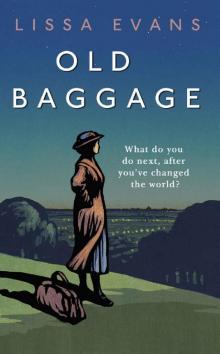 Old Baggage
Old Baggage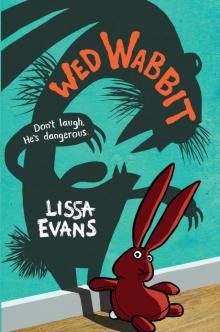 Wed Wabbit
Wed Wabbit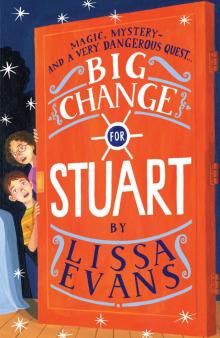 Big Change for Stuart
Big Change for Stuart Spencer's List
Spencer's List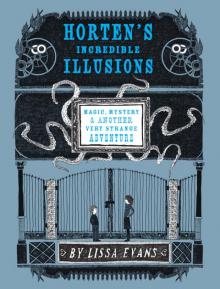 Horten's Incredible Illusions
Horten's Incredible Illusions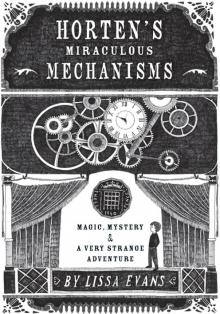 Horten's Miraculous Mechanisms
Horten's Miraculous Mechanisms Their Finest Hour and a Half
Their Finest Hour and a Half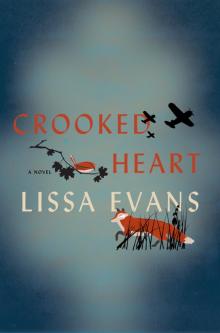 Crooked Heart
Crooked Heart